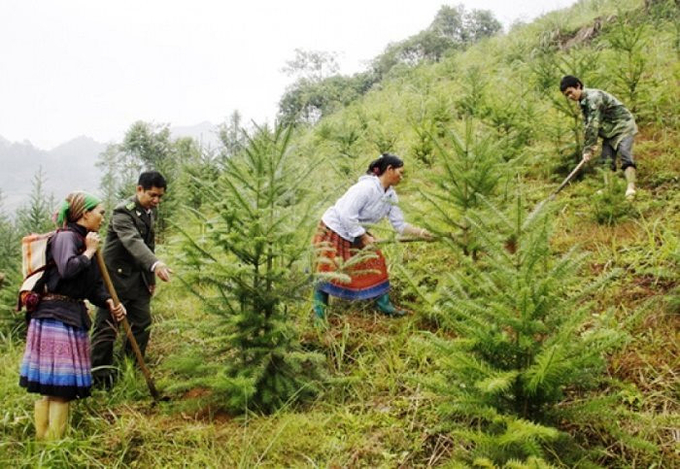November 25, 2025 | 23:02 GMT +7
November 25, 2025 | 23:02 GMT +7
Hotline: 0913.378.918
November 25, 2025 | 23:02 GMT +7
Hotline: 0913.378.918

Residential communities in the buffer zone of the special-use forest receive an average support of VND 50 million per year.
According to the Decree, based on the source of supported funding, the community determines the content of support in the following order of priority: agricultural and forestry extension activities, plant varieties and animal breeds, and small-scale farming and forestry product processing equipment.
Or construction materials for public community works, such as clean water works, lighting, communications, village roads, cultural houses, and other works.
Communities with a good forest protection process and no severe violations in forest protection are eligible to receive support.
Besides, there are approved plans and estimates and a commitment to forest protection with the special-use forest management board. Refrain from duplicating support content with projects invested in or supported by other state budgets approved by competent authorities.
There are three steps to implement the support sequence. First, plan, estimate, and approve support funding.
Every year, the village head meets with the community to propose content, plans, and budget estimates for support, agree on meeting minutes, and make plans and estimates for support to send to the People's Committee at the commune level and special-use forest management board.
The special-use forest management board presides over and coordinates with the commune-level People's Committee to meet with residential communities to request support and agree to co-approve plans and budget estimates for community support.
Second, the residential community self-organizes, implementing approved plans and budget support estimates. For issues that residential communities cannot organize and enforce themselves, the commune-level People's Committee or special-use forest management board is requested to support implementation.
In case there is a need to adjust the plan and support funding, the community requests the special-use forest management board or the Commune People's Committee to consider and adapt.
Third, the residential community organizes itself to supervise the implementation of plans and support funds according to the provisions of the law on democracy at the grassroots level.
After completing the approved support plan contents or ending the year, the special-use forest management board coordinates with the Commune People's Committee to organize acceptance. The acceptance results are shown in the acceptance record. Participants in the acceptance include representatives of the special-use forest management board, Commune People's Committees, and representatives of the residential community.
The Decree takes effect from July 15, 2024.
Translated by Huong Giang

(VAN) The Ministry of Agriculture and Environment must spearhead the construction of green governance, spanning decision-making processes and investment standards to policy evaluation mechanisms.

(VAN) The Agriculture and Environment sector of Khanh Hoa has achieved numerous milestones over the past 80 years, contributing significantly to the goal of establishing the province as a centrally governed city by 2030.

(VAN) Viet Nam is entering the pivotal period of 2025-2030, moving toward the formulation of the Remote Sensing Law, which will establish a legal foundation for the development of national digital data.

(VAN) The agricultural sector is finalizing the strategic framework for emission reduction, setting the goal of sharply cutting methane and 403.7 million tons of CO2 equivalent and moving toward Net Zero by 2050.
/2025/11/22/2236-1-153832_483.jpg)
(VAN) The National Marine Spatial Planning is opening up opportunities for sustainable blue sea development across 21 coastal localities.

(VAN) Viet Nam’s forestry sector is undergoing a comprehensive transformation, strengthening management, protection, and development efforts to maintain ecological security and drive green, sustainable growth.

(VAN) Viet Nam is accelerating efforts to digitize reservoir operations, from real-time data to hydraulic modelling.